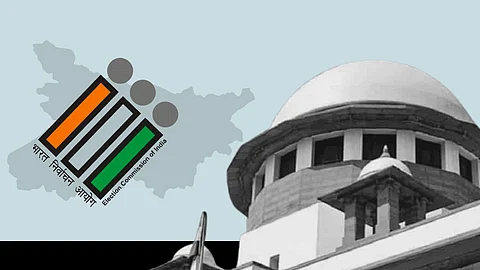

THE SUPREME COURT TODAY expressed concern over the lack of clarity surrounding the inclusion of 21 lakh new names in the final electoral rolls emerging from the three-month exercise of the Election Commission of India’s Special Intensive Revision (SIR) of Bihar’s electoral rolls, questioning whether these newly added voters were genuinely new or drawn from the list of 65 lakh voters those were deleted earlier in the draft electoral rolls.
Observing that there is an “appreciation of numbers in the final electoral rolls, a bench of Justices Surya Kant and Joymalya Bagchi said that there was “confusion” whether the 21 lakh newly added voters were from among 65 lakh voters whose names had been deleted earlier in the draft rolls or entirely fresh entrants to the rolls. The bench said that some of them would be new voters.
Responding to the observation from the bench, Senior Advocate Rakesh Dwivedi, appearing for the Election Commission, told the Bench that “most of the add-ons voters are new”.
Appearing for the NGO Association for Democratic Reforms (‘ADR’), advocate Prashant Bhushan alleged that the most of the excluded voters were Muslims and women. “Instead of cleaning up the rolls, the process has compounded the problem,” he said, urging the Court to direct publication of the lists showing the 3.66 lakh voters deleted after the draft roll and the 21-lakh added in the final version.
Bhushan maintained that the reasons for exclusion had not been communicated to affected individuals. “The Election Commission has not given reasons for deletions, nor has it published the list of 3.66 lakh additional deletions after the draft rolls,” he submitted.
When the Bench asked whether such voters could not file appeals, Senior Advocate Abhishek Manu Singhvi intervened to point out that three cannot be an appeal in the absence of any official intimation. “Persons who are deleted don’t receive any notice or reasons. Without that, there is no question of appeal. The least they can do is inform,” Singhvi said.
‘Responding to these concerns, Justice Surya Kant said, “If anyone can give the list of voters out of these 3.66 lakh who have not received orders, we will direct the ECI to give them those orders. Everyone has the right to appeal.”
Bhushan insisted that the Commission must publish the full list of deleted names online, calling it the only way to ensure addressing the issue. Dwivedi, however, dismissed the allegations, contending that “none of the affected voters have approached the Court; only politicians and NGOs in Delhi are raising the issue.”
He added that the petitioners had not challenged the final electoral roll released on September 30. “This is not the stage to open the entire process again,” Dwivedi argued, pointing out that the Commission has already announced elections to Bihar assembly.
Singhvi said that without publication of names, it was impossible to verify who had been removed or newly enrolled. “Sixty-five lakh persons were deleted after the draft was issued, and while 21 lakhs were said to have been added later, it’s unclear whether these are reinstated voters or new additions,” he noted.
Justice Bagchi echoed the point, saying the Court needed to understand the composition of the final list. Whether the increase in the number of voters is on account of restoring earlier deleted voters or inclusion of new voters.
Dwivedi reiterated that most of the added names were new voters, prompting Justice Bagchi to observe, “This exercise is in aid of the electoral process that you have started, so that the confidence in the electoral process is fortified."
Justice Kant added that the Court could pass specific directions only if a prima facie case of wrongful deletion was shown.
Stating that he can bring 100-200 such people before the court, Bhushan said that there was an “en-masse violation” of the commission’s own rules, manual and guidelines. How many do you want?” handing over an affidavit from one voter whose name had been struck off.
Telling the court that the poll process in Bihar has already commenced, Dwivedi cited Article 329 of the Constitution, which bars judicial interference once elections are notified. He said the ECI had already followed the Supreme Court’s earlier directions, including permitting the Aadhaar card as a 12th document for voter identification and inclusion.
However, Justice Bagchi said, “Mr Dwivedi and Mr Maninder Singh, you have both the draft and final lists. The omissions are identifiable. Just cull that out and give us the information,” Justice Bagchi told the ECI’s counsel.
Bhushan interjected, saying, “The ECI can do this with the click of one button.” He said it was a difficult job for the petitioners to do.
Justice Kant replied, “The question of probing so much will arise when there are genuine people. There are also illegal immigrants who do not want to be exposed. Let’s have a list of 100–200 people who say they want to appeal but have not received orders.”
The controversy stems from the ECI’s Special Intensive Revision (‘SIR’) of Bihar’s voter list, which began in June 2025. Earlier, on July 28, the Supreme Court had permitted publication of the draft electoral rolls while directing the ECI to consider Aadhaar and EPIC cards as valid documents for inclusion in voters list. When reports later suggested that 65 lakh names had been deleted, the Court ordered the Commission to publish the list of excluded voters and allow them to reapply online.
On September 8, the Court clarified that Aadhaar could serve as an identity document but not as proof of citizenship. Despite these directions, the petitioners claim the ECI’s final roll lacks transparency and that the mass deletions have disproportionately affected minority communities and women.
The matter will now come up for hearing on October 9.